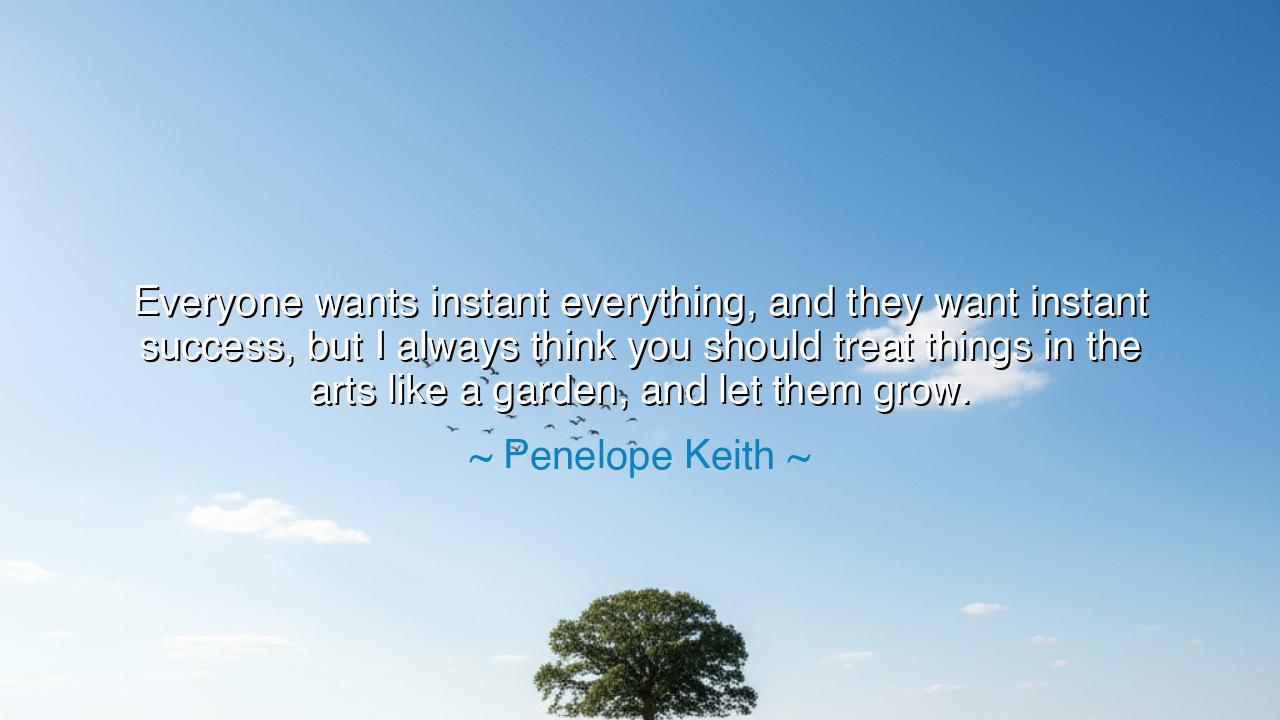
Everyone wants instant everything, and they want instant success
Everyone wants instant everything, and they want instant success, but I always think you should treat things in the arts like a garden, and let them grow.






The words “Everyone wants instant everything, and they want instant success, but I always think you should treat things in the arts like a garden, and let them grow” were spoken by Penelope Keith, the acclaimed English actress known for her grace, wit, and timeless artistry. Though born in the world of theater, these words transcend the stage — they speak to the essence of all creation, of patience, and of the sacred rhythm by which life itself unfolds. Keith reminds us that the greatest achievements — in art, in craft, in spirit — cannot be rushed. True mastery, like a well-tended garden, requires time, care, and devotion. Her words echo a wisdom long forgotten in an age obsessed with immediacy: that beauty which endures must be allowed to grow, not manufactured overnight.
When Keith laments that “everyone wants instant everything,” she names the restless spirit of our time — the impatience that hungers for reward without labor, applause without struggle. We live in an age of speed, where seeds are demanded to bloom before they are even sown. Yet art, like life, follows a different law. The artist’s journey cannot be hurried, for it is rooted in experience, humility, and failure as much as talent. The same soil that nourishes the flower must first be broken by storms. Just as no gardener can command the sun or force the rain, no artist can command inspiration or mastery — they must wait, tend, and grow.
In comparing art to a garden, Keith evokes one of the oldest and most sacred metaphors in human thought. The garden has always symbolized creation in its purest form — the meeting of human effort and divine mystery. The gardener labors, yet it is nature that brings life. In this balance lies wisdom: we may plant the seed, but we must trust time for the harvest. The artist, too, must plant his ideas, nurture his craft, and accept that the fruits of creation ripen not by will, but by faithful persistence. In the end, both gardener and artist become co-creators with the eternal — participants in the slow unfolding of beauty.
History has shown that those who understand this rhythm achieve greatness that endures beyond their age. Consider Michelangelo, who spent four years painting the ceiling of the Sistine Chapel, often working alone, suspended on scaffolding, his body strained and his eyes filled with paint. He refused haste, knowing that sacred art must unfold with reverence. Or Beethoven, who labored through deafness, rewriting symphonies over and over, until each note reached its full bloom. Neither man sought instant triumph. They tended their gifts like gardens, through seasons of silence and toil, until the world could one day behold their harvest. Their patience became their immortality.
Keith’s words also reflect an ethical truth about human nature itself. What grows too quickly often withers just as fast. A tree that shoots up without deep roots cannot weather the storm. Likewise, an artist or creator who chases fame before forming foundation risks collapse under the weight of their own ambition. Growth requires not only sunlight but shadow — moments of solitude, reflection, and imperfection. The gardener knows that decay feeds new life, that winter is as necessary as spring. So too must the artist embrace struggle, for without it, their work lacks depth and soul. Enduring art is not born of impatience but of love and labor.
Her insight extends beyond the arts. It applies to every craft, every dream, every human endeavor. In a world where people demand instant results — in business, in relationships, in self-discovery — Keith’s wisdom reminds us that the laws of growth cannot be defied. To build something meaningful, one must accept time as an ally, not an enemy. The greatest gardens, the most profound works, and the most resilient souls are those that have endured the slow seasons of tending — seasons where nothing seems to grow, yet roots deepen unseen beneath the surface.
The lesson, then, is timeless: plant your dreams like seeds, and have the patience to let them take root. Do not envy those who bloom quickly, for their blossoms may not endure. Nurture your craft, your mind, and your heart daily, even when progress seems invisible. Trust that time, care, and persistence will yield the richest harvest.
Practical actions: Create daily, but without haste. Tend to your learning as a gardener tends to soil — removing weeds of doubt, watering your faith with steady effort. Welcome the seasons of waiting, for they prepare you for your own spring. And above all, remember Penelope Keith’s wisdom: that the most beautiful creations — in art, in love, in life — must be allowed to grow, not rushed to completion. For only that which grows with time can truly last.






AAdministratorAdministrator
Welcome, honored guests. Please leave a comment, we will respond soon